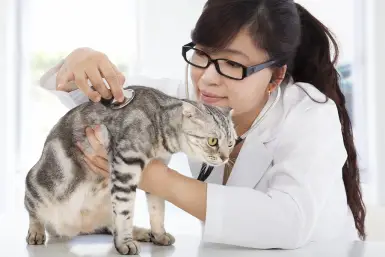
Browse Categories
- Dog Boot Camps
- Test
- Test
- Dogs Please Clicker Training
- Pet Insurance Comparison
- Exercising Pets With An E Scooter
- 10 Reasons Why Guinea Pigs Are Wholesome Little Pets
- Why You Should Use a Shed to House Your Pet
- How can Dog Owners Keep their Carpets Clean?
- How to Keep Your House in Order With Large Pets
- What is the Best Way to Feed a Puppy to Keep Them Healthy
- Pets Please
- All Animals and Pets
- Dogs and Puppies
- Cats and Kittens
- Birds
- Fish
- Reptiles
- All Other Small Pets
- Claws 'N' Paws Events
- PetsInLimbo/Greys4PetsInc.
News Search
PetsPlease News and Advice
Symptoms, Diagnosis and Treatment of Feline Distemper
Feline distemper, also known as Feline Panleukopenia, can be difficult to detect unless your cat is examined by a veterinarian. This disease, just like distemper in dogs, is life threatening. Although there is no cure available for feline distemper, preventing it is possible as well as figuring out the symptoms as early as possible for proper care to be provided.
Symptoms of Feline Distemper
It is always important that you are aware of any changes in your feline’s behaviour. Treatment should be provided as early as possible to help your cat’s immune system. Here are the symptoms that are sure to crop up in your pet cat during the first week of being exposed to feline distemper.
- High fever
- Loss of appetite
- Depression
- Less movement and less noise
- Vomiting clear liquid if no food is eaten
- Dehydration
- Diarrhea with blood on stool
- Dull coat as the cat becomes less concerned with its appearance
- Abdominal pain
The more severe the infection is the worse the symptoms will be. Convulsions can occur and death will most likely to occur.
Cats can acquire feline distemper from other cats that are infected with it. This disease cannot be passed from cats to human or even between cats and dogs.
Diagnosing Feline Distemper
Like it was mentioned before, it can be difficult to determine whether your cat is infected by distemper or not as the symptoms can be similar to other feline sickness. The only way for you to make sure is to bring your cat to your veterinarian for him to run diagnosis. Usually a blood test can help check if distemper is present. Keep in mind that kittens have a harder time getting over this disease.
Feline Distemper Treatment
Although there is no definite treatment for feline distemper, veterinarians usually administer medication that will help with the symptoms. The treatments provided are for diarrhea and vomiting to prevent dehydration that can harm your cat.
For cats that are already suffering from dehydration, I.V fluids will be required and your pet will have to stay overnight. Antibiotics will most likely be administered as well since your pet’s immune system is already compromised. This helps in preventing further bacteria from getting hold of your pet.
It is important that you are aware of what feline distemper can do to your cat as this is one of the worst diseases that your pet can suffer from. Make sure that your cat gets its regular examination to keep it healthy.
